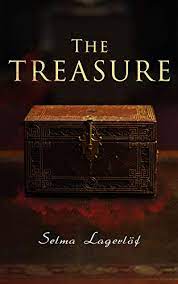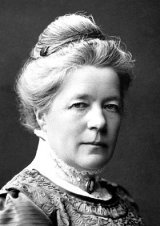The Treasure Page #3
The Treasure is a 1904 novel by the Swedish writer Selma Lagerlof. Its original Swedish title is Herr Arnes penningar, which means "Mr. Arne's money". It has also been published in English as Herr Arne's Hoard. Set in Bohuslän in the 16th century, it tells the story of a group of Scottish mercenaries who escape from prison; they go on to murder a family to steal a treasure chest, after which one of them falls in love with the family's sole survivor.
Torarin saw at once that no man here thought of making his weapon ready for a deed of blood. He slammed the door again and would have gone his way, but the host came after him. He asked Torarin to stay, since he had come, and led him into the room. Torarin sat for a good while enjoying himself and chatting with the peasants. They were in high good humour, and Torarin was glad to be rid of all his gloomy thoughts. But Torarin was not the only latecomer to the feast that evening. Long after him a man and a woman entered the door. They were poorly clad and lingered bashfully in the corner between door and fireplace. The host at once came forward to his two guests. He took the hand of each and led them up the room. Then he said to the others: "Is it not truly said that the shorter the way the more the delay? These are our nearest neighbors. Branehog had no other tenants besides them and me." "Say rather there are none but you," said the man. "You cannot call me a tenant. I am only a poor charcoal-burner whom you have allowed to settle on your land." The man seated himself beside Torarin and they began to converse. The newcomer told Torarin how it was he came so late to the feast. It was because their cabin had been visited by three strangers whom they durst not leave, three journeymen tanners who had been with them all day. When they came in the morning they were worn out and ailing; they said they had lost their way in the forest and had wandered about for a whole week. But after they had eaten and slept they soon recovered their strength, and when evening came they had asked which was the greatest and richest house thereabout, for thither they would go and seek for work. The wife had answered that the parsonage, where Herr Arne dwelt, was the best place. Then at once they had taken long knives out of their packs and begun to sharpen them. They were at this a good while, with such ferocious looks that the charcoal-burner and his wife durst not leave their home. "I can still see them as they sat grinding their knives," said the man. "They looked terrible with their great beards that had not been cut or tended for many a day, and they were clad in rough coats of skin, which were tattered and befouled. I thought I had three werewolves in the house with me, and I was glad when at last they took themselves off." When Torarin heard this he told the charcoal-burner what he himself had witnessed at the parsonage. "So it was true enough that this night they whetted knives at Branehog," said Torarin, laughing. He had drunk deeply, because of the sorrow and heaviness that were upon him when he came, seeking to comfort himself as best he could. "Now I am of good cheer again," said he, "since I am well assured it was no evil omen the parson's lady heard, but only these tanners making ready their gear." IV Long after midnight a couple of men came out of the house at Branehog to harness their horses and drive home. When they had come into the yard they saw a great fire flaring up against the sky in the north. They hastened back into the house and cried out: "Come out! Come out! Solberga parsonage is on fire!" There were many folks at the feast, and those who had a horse leapt upon his back and made haste to the parsonage; but those who had to run with their own swift feet were there almost as soon. When the people came to the parsonage nobody was to be seen, nor was there any sign of movement; all seemed to be asleep, though the flames rose high into the air. Yet it was none of the houses that burned, but a great pile of wood and straw and faggots that had been stacked against the wall of the old dwelling. It had not been burning long. The flames had done no more than blacken the sound timber of the wall and melt the snow on the thatched roof. But now they had begun to take hold of the thatch. Everyone saw at once that this was arson. They began to wonder whether Herr Arne and his wife were really asleep, or whether some evil had befallen them. But before the rescuers entered the house they took long poles and pulled away the burning faggots from the wall and clambered up to the roof to tear off the thatch, which had begun to smoke and was ready to catch fire. Then some of the men went to the door of the house to enter and call Herr Arne; but when the first man came to the threshold he turned aside and made way for him who came next. The second man took a step forward, but as he was about to grasp the door-handle he turned away and made room for those who stood behind him. It seemed a ghastly door to open, for a broad stream of blood trickled over the threshold and the handle was besmeared with blood. Then the door opened in their faces and Herr Arne's curate came out. He staggered toward the men with a deep wound in his head, and he was drenched with blood. For an instant he stood upright and raised his hand to command silence. Whereupon he spoke with the death rattle in his voice: "This night Herr Arne and all his household have been murdered by three men who climbed down through the smoke-hole in the roof and were clad in rough skins. They threw themselves upon us like wild beasts and slew us." He could utter no more. He fell down at the men's feet and was dead. They then entered the room and found all as the curate had said. The great oaken chest in which Herr Arne kept his money was gone, and Herr Arne's horse had been taken from the stable and his sledge from the shed. Sledge tracks led from the yard across the glebe meadows down to the sea, and twenty men hastened away to seize the murderers. But the women set themselves to laying out the dead and carried them from the bloody room out upon the pure snow. Not all of Herr Arne's household could be found; there was one missing. It was the poor little maid whom Herr Arne had taken into his house. There was much wondering whether, perchance, she had been able to escape, or whether the robbers had taken her with them. But when they made careful search through the room they found her hidden away between the great stove and the wall. She had kept herself concealed there throughout the struggle and had taken no hurt at all, but she was so sick with terror that she could neither speak nor answer a question. CHAPTER II ON THE QUAYS The poor maid who had escaped the butchery had been taken by Torarin to Marstrand. He had conceived so great pity for her that he had offered her lodging in his cramped cabin and a share of the food which he and his mother ate. "This is the only thing I can do for Herr Arne," thought Torarin, "in return for all the times he has bought my fish and allowed me to sit at his table." "Poor and lowly as I am," thought Torarin, "it is better for the maid that she go with me to the town than that she stay here among the country folk. In Marstrand are many rich burgesses, and perhaps the young maid may take service with one of them and so be well cared for."
Translation
Translate and read this book in other languages:
Select another language:
- - Select -
- 简体中文 (Chinese - Simplified)
- 繁體中文 (Chinese - Traditional)
- Español (Spanish)
- Esperanto (Esperanto)
- 日本語 (Japanese)
- Português (Portuguese)
- Deutsch (German)
- العربية (Arabic)
- Français (French)
- Русский (Russian)
- ಕನ್ನಡ (Kannada)
- 한국어 (Korean)
- עברית (Hebrew)
- Gaeilge (Irish)
- Українська (Ukrainian)
- اردو (Urdu)
- Magyar (Hungarian)
- मानक हिन्दी (Hindi)
- Indonesia (Indonesian)
- Italiano (Italian)
- தமிழ் (Tamil)
- Türkçe (Turkish)
- తెలుగు (Telugu)
- ภาษาไทย (Thai)
- Tiếng Việt (Vietnamese)
- Čeština (Czech)
- Polski (Polish)
- Bahasa Indonesia (Indonesian)
- Românește (Romanian)
- Nederlands (Dutch)
- Ελληνικά (Greek)
- Latinum (Latin)
- Svenska (Swedish)
- Dansk (Danish)
- Suomi (Finnish)
- فارسی (Persian)
- ייִדיש (Yiddish)
- հայերեն (Armenian)
- Norsk (Norwegian)
- English (English)
Citation
Use the citation below to add this book to your bibliography:
Style:MLAChicagoAPA
"The Treasure Books." Literature.com. STANDS4 LLC, 2025. Web. 10 Mar. 2025. <https://www.literature.com/book/the_treasure_6>.








Discuss this The Treasure book with the community:
Report Comment
We're doing our best to make sure our content is useful, accurate and safe.
If by any chance you spot an inappropriate comment while navigating through our website please use this form to let us know, and we'll take care of it shortly.
Attachment
You need to be logged in to favorite.
Log In